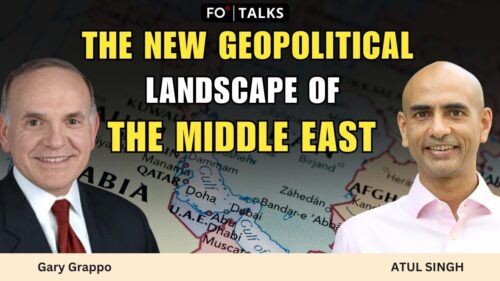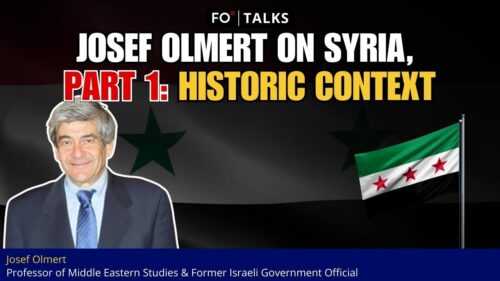Josef Olmert: Hello. Hi again to my loyal viewers and readers, and followers. I’m starting a new series, a short one of three episodes, about the Israeli–US relations. A topic which is big, big on the agenda of many people in Israel, in the Middle East, in the US, a topic that has become very relevant as a result of recent developments, including what may seem to be, and apparently is, a change in the tone — at least in the tenor — of the Trump administration with regard to Israel and to some Middle East issues.
And my historical background conversation in this particular episode is not going too far back. It is going to the Second World War, and what would follow later on: the establishment of the State of Israel and the beginning of the relationship between the two countries. And it will include elements that may not be an historic revelation, but when put all in one context, may be surprising to quite a few of the watchers and readers, because it may put in some perspective some of the well-established notions about the relationship between the two countries that have always been dubbed, at least in the last few decades, as the special relationship, the unbreakable alliance, the God-knows-what type of definition given to this relationship by both friends of these relationships and enemies of it.
So let’s go to the Second World War and start with a general comment, which is that once the US entered the war — finally, after the Japanese attack on Pearl Harbor on December 7, 1941, which is basically the end of American isolationism — with all its might, with all its power, that America had to develop foreign policy which hardly existed until then about the Middle East. Which was really at that time, until the Second World War, not an important part to the US, but for the beginning of some commercial economic relations having to do with oil, of course. And oil is important, as we shall see.
Harold Hoskins, the Holocaust and Zionist response
Josef Olmert: So President Roosevelt went to develop an American strategy as to how to deal with current issues during the Second World War and future implications of them. He did something which may have been the precedent for other American presidents: He sent a special envoy to the Middle East. His name was Harold Hoskins. He was a former military person, lieutenant colonel — and he had an interesting background. He belonged to a family that had to do with the American University in Beirut, a famous academic institution, the role of which in American–Arab relations has not always been recognized properly.
The university was established in 1866 and became a hotbed for two groups of people. On the one hand, Americans who came to the Middle East — mostly Protestant missionaries, interestingly enough, from New England — who came to the Middle East following the terrible, bloody civil war in Lebanon between 1840 and 1861 that ended with the huge massacre of Christians in 1861. And the other group that it attracted were those Americans who were influenced by the existence of this college, were interested in the Arab world, in the Middle East, and would become, later on, ambassadors of goodwill for the Middle East — being basically dominated by Arabs, by those who use the Arabic language, and mostly by Muslims, not even Christians.
So Hoskins, therefore, did not come from a background that one could say was pro-Jewish or pro-Zionist. On the contrary — he came from a totally different background, the opposite one. And he visited the Middle East in 1942, 1943 and then presented his report to the president, which basically was saying to the president, “Hey, look, you cannot really support the Jewish idea about establishing a state. There’s the Arab world, you know.” And one can argue he accepted the basic tenets of what one would call the pro-Arab lobby in the US at that time — and maybe for many years later — that the US should go with the majority of people in the Middle East, not with the minority: the Jews.
Now, at that time, when Hoskins was in the Middle East and then presented his recommendations to the president, there was the Holocaust in Europe, and two developments emerged that would be the counterbalance to this report of Hoskins. One of them was the dramatic, dramatic revelations by this Gentile, German Tzadik — the righteous among the Gentiles — Edward Schulte, who came one day to the young representative of the World Jewish Congress in Geneva, Gerhart Riegner, a young Jewish person at the age of 30, and told him, “Do you need to know the truth? They are going to kill all your people in Europe. Urgently message this truth to your superiors so that the Western countries will do what they have to do.”
I’m not going to get into all that — just to give it as a background with all the controversies that emerged later on about the reaction of the Roosevelt administration, or the lack thereof, the slowness of the reaction. But it was one element that was introduced to the discussion about the Middle East at that time and the future, which had to do with the fate of the Jews in Europe and what could be a solution to their plight.
But at the same time, also, the Zionist movement reacted. And the famous Biltmore Plan that was announced in the Biltmore Hotel of New York at that time — a great place, not anymore — a conference that took place between May 6 and May 11, 1942, in which finally, finally, the leadership or the majority of the official Zionist movement accepted the idea that the future should be a Jewish commonwealth — that’s the word they used — in what they called Palestine. Accepted finally what the revisionist side of the Zionist movement, under the leadership of the great Ze’ev Jabotinsky, had said for many years earlier — that the final, ultimate goal of Zionism is to do exactly that: national liberation movement of the Jewish people, and the national homeland of the Jewish people, the land of Israel — or Palestine, as they called it — should be a state.
So Roosevelt knew that there were pressures from both sides, and at the end of the day, he did not make a big speech in which he repeated the recommendations of Hoskins. He even established, later on, the Refugee Board to save Jews in Europe — which did, by the way, good work. Raoul Wallenberg, the great man, was an agent of this group.
Roosevelt’s oil deal
Josef Olmert: But then the next chapter, if you will. In between, there were all kinds of negotiations with the British that also had their committees about what would be the future of the Middle East and Palestine. There was this historic meeting on February 14, 1945 in the Suez Canal aboard the ship of the American Navy between the president and the king of Saudi Arabia, King Ibn Saud — a historic meeting that established, by the way, the real, ongoing, historic special relationship between the US and a country in the Middle East, which was the Kingdom of Saudi Arabia. End of 1945: This is the most permanent, consistent, solid alliance between the US and any country in the Middle East, which may have been shaken — we’ll come to that later on in the series — during the 21st century, but has been and still is the one alliance that can be considered the uninterrupted historic alliance of the US with its new role as the superpower and the Middle East country.
There are all kinds of historians that will tell you, “This was this result of that meeting, and this was that result of that meeting.” But since I’m the one who talks here, I will say to you: This was the deal of oil for protection. The US will defend Saudi Arabia, Saudi Arabia will give oil to the US. That’s it. That was the deal.
And then the president came back, was almost a dead person — he would die a little bit later on April 12, 1945. But before then, on March 1, 1945, he gave his big speech to Congress in which he said the famous statement that in five minutes of talk with King Ibn Saud, he learned more about the Middle East than what he had known before. Which was, in a way, a reflection of, apparently, his inner thoughts, but also a slap in the face to a lot of people in the Jewish community, people like Rabbi Stephen Wise and others who believed that Roosevelt was the greatest ever supporter of the Jewish people. He said something that to this very day is used by many people, particularly on the right side of Jewish and Zionist politics, to indicate that FDR was not exactly the great friend of the Jews he was portrayed to be.
Truman’s recognition and Israel’s fight for survival
Josef Olmert: And then came Harry Truman. What did he know about the Middle East? Nada, nothing. What did he know about foreign policy? Nada, nothing. But he was a great person, great president. And he knew to make decisions. And he had to make decisions about the question of Palestine on two accounts: First of all, what to do with the Zionist demand to allow refugees from Europe to go to their historic homeland as their final refuge after what happened. The British said no, the Americans put pressure to allow hundreds of thousands to come. But then the most important decision had to be done: Should America support or not the establishment of a Jewish state in Palestine? And he made the resolution that America should support the Partition Plan, as proposed by the UN Inquiry that was approved by the General Assembly in the historic decision on November 29, 1947. Which was accepted by the Zionist majority as an official position, and was rejected by all the Arabs, the Palestinian Arabs and the Arab states.
The question was: Was it really the final decision of Truman? Would he go along with it and support this Jewish state once it’s being declared? As the Zionists said, it would be declared the last day of the British mandate over Palestine, which was supposed to be May 15, 1948. They were supposed to declare it on May 14 because it was Friday as opposed to Saturday, which was May 15, the Sabbath.
And Truman was under terrible pressures. In January 1948, he retracted his initial position. He talked about international trusteeship for Palestine for a while. And there were pressures on him from both sides, including his old Jewish friend and business partner, Eddy Jacobson, on the one hand, as opposed to the Arabs and as opposed to some of the closest people to him. Chief among them: Secretary of State George Marshall, the great winner of the Second World War, secretary of state, the architect of the Marshall Plan — who was terribly opposed to the establishment of a Jewish state and to an American recognition of it. And he said to the president, “I will not vote for you if that’s your position.” The famous Clark Clifford, the well-known Democratic adviser, told the story. Other people told the story; there’s no question about it.
Truman made his decision: He gave the US recognition to the State of Israel 11 minutes after the declaration made by David Ben-Gurion in Tel Aviv on May 14, 1948. But that did not mean a carte blanche for the Zionists, for the Jews, in what ensued afterwards: the War of Independence that started with the invasion of five Arab armies on May 15 to the newly-established state, in order to basically exterminate the Jews, as was predicted by the Secretary-General of the Arab League, Azzam Pasha. He said in October 1947, “This will be a war of extermination.” This was what the Arabs planned for the Jews: the Nakba of the Jews, the destruction of the Jewish state, the extermination of the Jews three years after the Holocaust ended in the Second World War, the deportation of the Jews, whatever.
And America imported an embargo on arms to Israel. The ones who gave the arms to Israel at that time for their own reasons — we shall not get into it in this episode — arms that allowed the Israelis to win the war were the Soviets, the Soviet Union — the so-called, famous Czechoslovak arms deal. At that time already, Czechoslovakia was under communist control. Interesting, interesting.
Cold War choices and the Suez Crisis
Josef Olmert: But America recognized Israel, there were diplomatic relations. And then came another turning point: It was the Korean War of 1950. It really divided the world and also divided the ruling coalition in Israel at that time. Not always are people aware of that, because David Ben-Gurion, the leader of the Mapai party, had partners in the government that were to the left of Mapai — Marxists and Zionists, but very pro-Soviet. And they put pressure on Israel to at least be neutral in the Korean War, or even support the Soviet Union.
And Ben-Gurion made his historic decision: no way. He gave a famous speech in the Knesset, which also included an attack Joseph Stalin personally, and made the choice: We go with the West. Still having relations with the Soviet Union for a few more years to come that were problematic — including also the Soviet attempt toward the end of the days of Stalin to try the Jewish doctors with the so-called plot to poison the Soviet leadership, which was apparently a preparation for a final solution for the Jews in the Soviet Union.
Later on — just to put things in some perspective, and not everybody would like to hear what I’m going to say now — the famous Henry Kissinger said (he then apologized for that when it was published many, many years later) in closed sessions when he was in the Nixon administration, that the US would not have done anything if the Soviets were to put Jews in concentration camps and get rid of them. Yes, he said it. He then apologized for it. Many, many years later, it was revealed when documents were published that that’s what he said.
The next episode of the relationships is the Suez War of 1956, when Israel, France and Britain collaborated in the attack on Nasser of Egypt after all his aggressive acts against Israel that were perpetrated, by the way, from the Gaza Strip — Gaza that the Egyptians refused to give to the Palestinians as an independent or even autonomous state.
President Dwight D. Eisenhower was not a partner to all that. And even though we are already in the Cold War, the idea that two partners of the US in NATO, France and Britain, would collaborate with Israel in a war that was not coordinated with the US — a few days before the American presidential elections in 1956 — and while the Soviets were engaged in their situation in Hungary, that was against the sense of Eisenhower, that he was no more just the commander-in-chief of the Allied forces in Europe, as he was in the Second World War. He was now the head of the free world. And he collaborated with the Soviet Union at the height of the Cold War to force the British and the French to stop their support for Israel and withdraw from the Suez Canal. And the Israeli army was forced, after months, to withdraw from Sinai.
And a period of 11 years of peace and quiet along the border lasted until 1967. In January 1957, Eisenhower published the Eisenhower Doctrine, which was an attempt to counterbalance all this by basically saying, “It wasn’t because we liked Nasser what we did, but from now on, we say to Nasser: no more.” And that’s something more to do with the US and some other Arab countries — or the Middle East in general — that I will not get into.
Looking ahead to 1967
Josef Olmert: But 11 years were opened until 1967, which would be, in a way, a historic turning point in the relationships between the US and Israel. And that will be the gist of my second episode. The next episode will be 1967, the Six Days War, as a historic turning point — the beginning of what one might call the special relationship between Israel and the US.
I’ll see you then. Thank you.
[Lee Thompson-Kolar edited this piece.]
The views expressed in this article/video are the author’s own and do not necessarily reflect Fair Observer’s editorial policy.










































Comment
Most people do not realize that the US did not back Israel to the hilt in the earliest days of the Jewish nation. Remember that Israel was a socialist society in the early days with kibbutzim and got arms from the Soviet bloc in the early days.
Bravo, Josef!